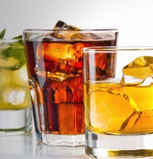Spirits industry afraid of their own ingredients?
The public health community is greatly disappointed about the SpiritsEurope approach to label their products, says Eurocare in a press statement about labelling of alcoholic beverages. Eurocare now asks if the sprits industry is afraid of the ingredients in their own products.
Labelling of consumer products has been an issue in the European Union for many years. Labelling of alcoholic beverages has in particular raised many conflicts. This is a paradox knowing that alcohol is one of the most harmful consumer products on the marked if one look at the Global Burden of Disease studies. Resistance to showing consumers what the alcohol bottles contain has in partcular come from the camps of beer, wine and spirits producers.

The European Alcohol Policy Alliance (Eurocare) has once again raised serious concerns over the situation and expresses great disappointment about SpiritsEurope's neative approach to labelling of their products. Eurocare makes reference to the EU Regulation 1169/2011 on the provision of food information to consumers. At that point in 2011 the spirits industry was granted a non-binding self-regulatory approach providing information about energy on label and information on ingredients and nutritional value online on the responsibledrinking.eu website or via QR codes.
However, Eurocare concludes that this has resulted only in insufficient information to alcohol consumers: "For example, on rum, it displays the following ingredient list: Rum, water, sugar (if used) and colour: plain caramel (if used).
Eurocare has received support from the European Public Health Alliance (EPHA): "The EU's self-regulatory experiment with alcohol labelling is leading to unsatisfactory outcomes for consumers. This is not much of a surprise. It confirms existing evidence that governance approaches relying on public private partnerships and voluntary industry commitments fail to deliver consistent results and real added value for public health", comments Fiona Godfrey, Secretary General of EPHA.
Also the Standing Committee of European Doctors (CPME) shares Eurocare's position: "European doctors are convinced that labels of all alcohol products should include nutritional information and health warnings. Adequate labelling is one way to protect the health of the population. Consumers may not realise that many alcoholic beverages contain a lot of sugar. This fact shouldn’t be hidden somewhere online’ stated Prof. Dr Frank Ulrich Montgomery, President of CPME.
Eurocare is the European branch of the Global Alcohol Policy Alliance (GAPA). Read the full text from Eurocare here.
RELATED ARTICLES
- Abstracts for GAPC 2020 – deadline 29 July 2019
- A regional African alcohol coordination mechanism is needed
- Next GAPC to be held in Dublin in March 2020
- Trouble Brewing
- The West African Alcohol Policy Alliance officially launched
- Alcohol policies must be an essential element in a national development strategy
- Focus on how evidence can be translated into action to reduce alcohol harm
- GAPC2017 to focus on mobilising for change
- Civil society networks call for stronger action against non-communicable diseases
- Alcohol policy alliance formed in West Africa

